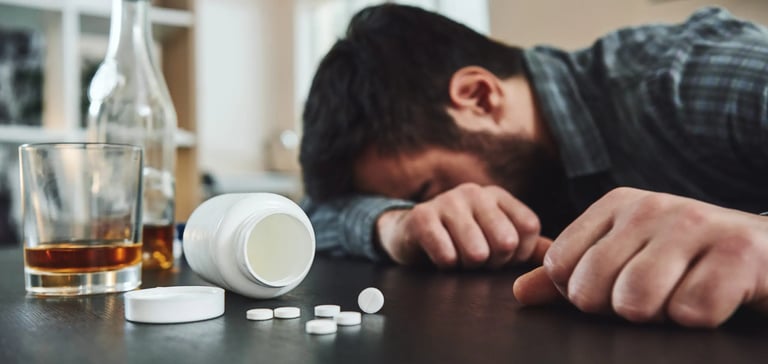Breaking Free from Substance Abuse: Understanding Symptoms, Causes, and Recovery Strategies
Learn about the signs, causes, and effects of substance abuse. Discover effective strategies for overcoming addiction and when to seek professional help for a successful recovery.
MENTAL HEALTH ISSUES
9/28/20244 min read


Substance abuse doesn’t just impact the individual—it affects families, relationships, and communities. It’s a complex issue that can start with recreational use and escalate into dependency, affecting physical and mental health. Understanding the symptoms, causes, and strategies for recovery can provide a pathway toward healing and help individuals reclaim control over their lives.
In this article, we’ll dive into the nature of substance abuse, explore its effects on the mind and body, and offer guidance on how to begin the recovery process. Whether you or a loved one are facing substance abuse challenges, knowing the steps to take is the first step toward lasting change.
What Is Substance Abuse?
Substance abuse refers to the harmful or hazardous use of psychoactive substances, including alcohol, prescription drugs, and illegal drugs. Over time, repeated use can lead to dependence, where the individual feels they cannot function without the substance. Substance abuse not only affects mental and physical health but can also disrupt work, relationships, and daily life.
While many people may experiment with substances, abuse occurs when the individual continues to use the substance despite its negative consequences. Addiction takes hold when the body and mind become dependent on the substance, leading to compulsive behaviors and loss of control.
How Does Substance Abuse Develop?
Substance abuse doesn’t happen overnight. It’s often the result of a combination of factors, including:
1. Genetic Predisposition: Individuals with a family history of substance abuse are more likely to develop similar issues, as genetics can play a significant role in addiction.
2. Environmental Influences: Peer pressure, stress, trauma, or exposure to environments where drug or alcohol use is normalized can increase the likelihood of substance abuse.
3. Mental Health Conditions: People with mental health disorders like anxiety, depression, or PTSD may turn to substances as a way to cope, leading to a cycle of dependence.
4. Brain Chemistry: Substance abuse alters the brain’s reward system, causing it to crave the substance and reinforcing the cycle of addiction.
Types of Substance Abuse
Substance abuse can involve a variety of substances, each with unique effects and risks. Here are some common categories:
1. Alcohol Abuse:
Excessive drinking, whether binge drinking or chronic alcohol use, can lead to dependence, liver damage, and impaired judgment.
2. Prescription Drug Abuse:
This involves the misuse of medications such as painkillers, sedatives, or stimulants. Prescription drug abuse often begins with legitimate use but can lead to addiction.
3. Illegal Drug Abuse:
Illegal drugs such as heroin, cocaine, methamphetamines, and marijuana can lead to severe physical and psychological dependence.
4. Nicotine Abuse:
Nicotine, often found in cigarettes or vapes, is highly addictive and can cause long-term health issues like lung disease and cancer.
5. Poly-Substance Abuse:
This occurs when individuals abuse more than one substance at a time, significantly increasing health risks and complicating recovery.
Symptoms of Substance Abuse vs. Occasional Use
Not all use leads to addiction, but it’s important to recognize the signs of abuse versus occasional or social use.
Occasional Use:
- Casual or social use of alcohol or drugs in specific settings.
- No cravings or loss of control over consumption.
- No interference with daily responsibilities or relationships.
Symptoms of Substance Abuse:
- Cravings: A strong urge to use the substance, even in inappropriate situations.
- Loss of Control: Inability to limit the amount of substance used or stop using despite wanting to quit.
- Neglect of Responsibilities: Failure to meet work, school, or family obligations due to substance use.
- Risky Behaviors: Using the substance in dangerous situations, such as driving under the influence.
- Withdrawal Symptoms: Experiencing physical or emotional withdrawal when not using the substance, such as anxiety, irritability, or nausea.
Symptoms of Substance Abuse
The symptoms of substance abuse vary depending on the individual and the substance used but can include:
- Physical Dependence: The body becomes reliant on the substance to function, leading to withdrawal symptoms like headaches, nausea, or tremors when not using it.
- Tolerance: Over time, the individual needs larger amounts of the substance to achieve the same effects.
- Neglected Responsibilities: Failing to fulfill obligations at work, school, or home due to substance use.
- Changes in Appearance and Behavior: Weight loss, poor hygiene, secretive behavior, or changes in sleep patterns.
- Social Withdrawal: Withdrawing from family and friends or only associating with those who encourage substance use.
- Mood Swings: Irritability, depression, or anxiety when not using the substance.
Simple Tips for Managing Substance Abuse in Daily Life
If you or a loved one are struggling with substance abuse, there are ways to start the recovery process:
1. Acknowledge the Problem: The first step in overcoming substance abuse is recognizing that there is a problem. Denial only prolongs the cycle of addiction.
2. Build a Support Network: Reach out to family, friends, or support groups who can offer encouragement and accountability throughout the recovery process.
3. Set Small, Achievable Goals: Recovery doesn’t happen overnight. Set realistic goals for reducing use or avoiding triggers that lead to substance use.
4. Stay Physically Active: Exercise can help manage stress, reduce cravings, and improve overall mental health during recovery.
5. Seek Professional Help: Overcoming substance abuse is often too difficult to manage alone. Professional counseling, rehab programs, and support groups like Alcoholics Anonymous (AA) or Narcotics Anonymous (NA) can provide the necessary tools and guidance.
When Should You Seek Professional Help for Substance Abuse?
If substance use is affecting your ability to function in everyday life or you’re experiencing withdrawal symptoms when not using, it’s time to seek professional help. Treatment options include detox programs, inpatient or outpatient rehab, therapy, and support groups.
Consider seeking professional help if:
- Substance use has led to health problems or risky behaviors.
- Relationships, job performance, or schoolwork are suffering due to substance use.
- You’ve tried to quit but keep relapsing.
- You experience withdrawal symptoms like anxiety, irritability, or physical pain when not using.
Therapists, addiction specialists, and rehab centers can provide tailored recovery plans to help individuals break free from substance abuse and live healthier lives.
Conclusion: Overcoming Substance Abuse
Substance abuse is a powerful force, but it’s not unbeatable. With the right support, treatment, and personal commitment, recovery is possible. The journey may be challenging, but breaking free from substance abuse opens the door to a healthier, more fulfilling life.
Substance abuse doesn’t define you—it’s a challenge that can be overcome. With the right support and dedication, you can reclaim your life and find a new path forward.
